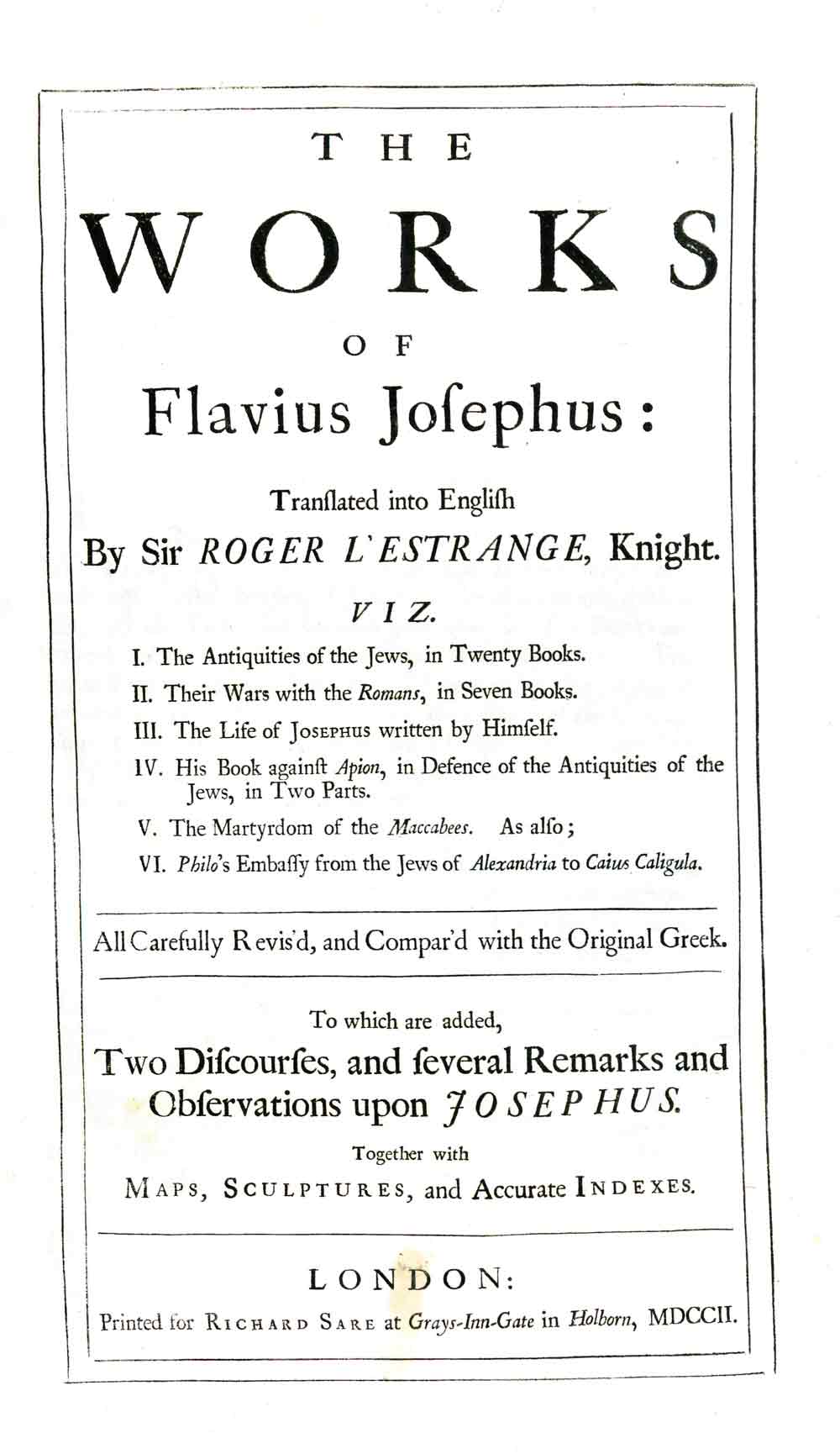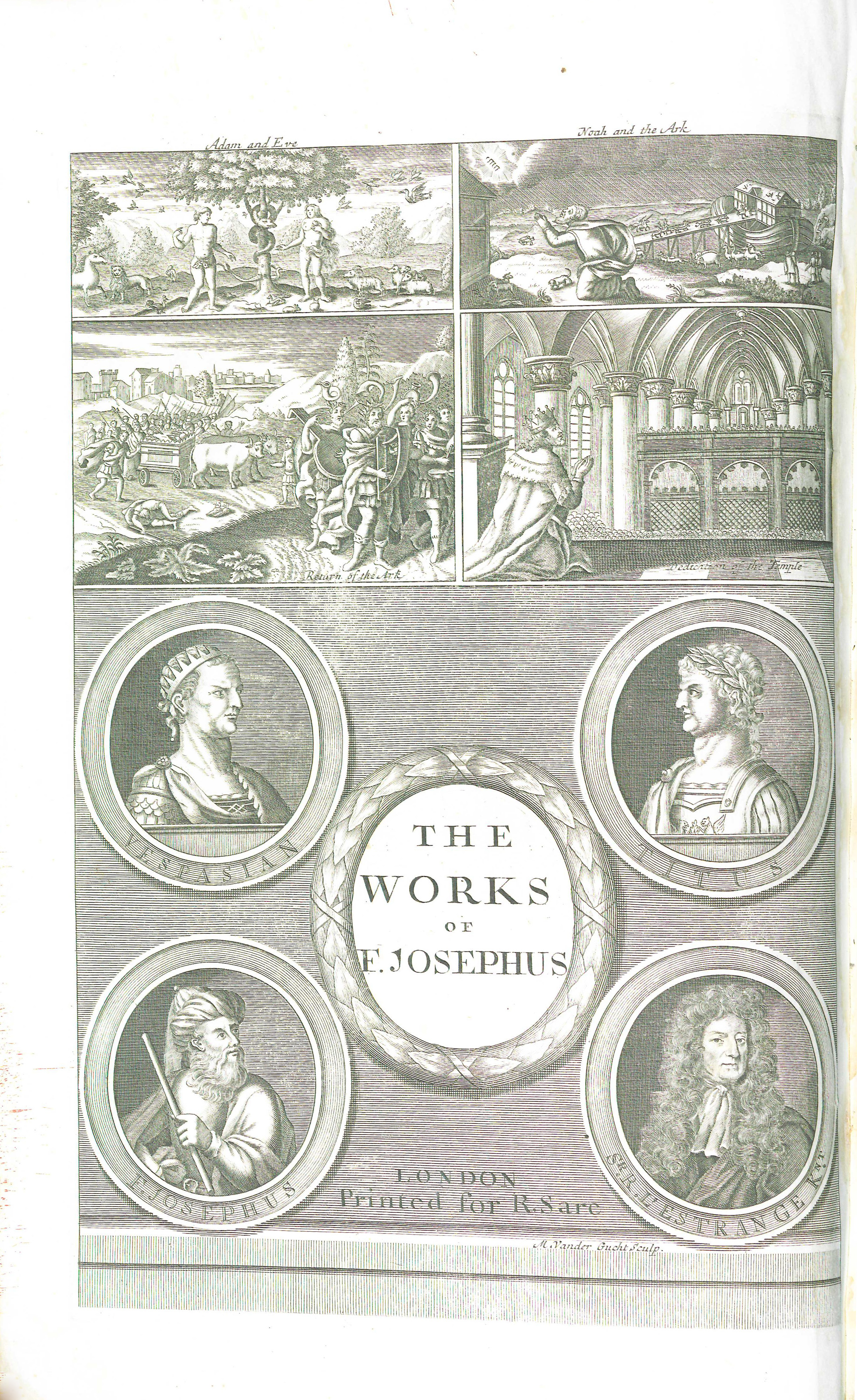Difference between revisions of "Works of Flavius Josephus"
| Line 15: | Line 15: | ||
|pages=[6], 18, 1130 [i.e. 942] | |pages=[6], 18, 1130 [i.e. 942] | ||
|desc=Folio (41 cm.) | |desc=Folio (41 cm.) | ||
| − | }}[[File:WorksofFlaviusJosephus1702Frontispiece.jpg|left|thumb|250px|<center>Frontispiece.</center>]][http://en.wikipedia.org/wiki/Flavius_Josephus Flavius Josephus] lived from 37 to c. 100 C.E. and wrote his histories and autobiography in Greek, quite possibly to reach the upper social classes and lessen their prejudices against the Jewish people. He began writing around 66 C.E., with his book on the Jewish War, and finished around 90 C.E., with his autobiography.<ref>K. Hoeber, [http://www.newadvent.org/cathen/08522a.htm “Flavius Josephus"], in ''The Catholic Encyclopedia'' (New York: Robert Appleton Company, 1910), accessed October 3, 2013, .</ref> Perhaps the most famous of Josephus’ works is the ''Jewish Antiquities'', which contains his account of Jewish history, beginning with the creation story and ultimately discussing Jesus and the Christians who were | + | }}[[File:WorksofFlaviusJosephus1702Frontispiece.jpg|left|thumb|250px|<center>Frontispiece.</center>]][http://en.wikipedia.org/wiki/Flavius_Josephus Flavius Josephus], born Joseph ben Matityahu in Jerusalem, lived from 37 to c. 100 C.E. and wrote his histories and autobiography in Greek, quite possibly to reach the upper social classes and lessen their prejudices against the Jewish people. He began writing around 66 C.E., with his book on the Jewish War, and finished around 90 C.E., with his autobiography.<ref>K. Hoeber, [http://www.newadvent.org/cathen/08522a.htm “Flavius Josephus"], in ''The Catholic Encyclopedia'' (New York: Robert Appleton Company, 1910), accessed October 3, 2013, .</ref> Perhaps the most famous of Josephus’ works is the ''Jewish Antiquities'', which contains his account of Jewish history, beginning with the creation story and ultimately discussing Jesus and the Christians who were the contemporaries of Josephus.<ref>Ibid.</ref><br /> |
<br /> | <br /> | ||
| − | ''The Works of Flavius Josephus'' is a collection of manuscripts that detail ancient Jewish history and culture.<ref>James Carleton Paget, "Some Observations on Josephus and Christianity," ''Journal of Theological Studies'' 52, no. 2 (October 2001), 539.</ref> The rise in Protestant Christianity during the eighteenth century would have made such a collection very significant.<ref>Erin E Kelly. "Jewish History, Catholic Argument: Thomas Lodge's Workes of Josephus as a Catholic Text," ''Sixteenth Century Journal'' 34, no. 4 (Winter 2003): 993.</ref> Christians valued the works of Josephus because of the historical information | + | ''The Works of Flavius Josephus'' is a collection of manuscripts that detail ancient Jewish history and culture.<ref>James Carleton Paget, "Some Observations on Josephus and Christianity," ''Journal of Theological Studies'' 52, no. 2 (October 2001), 539.</ref> The rise in Protestant Christianity during the eighteenth century would have made such a collection very significant.<ref>Erin E Kelly. "Jewish History, Catholic Argument: Thomas Lodge's Workes of Josephus as a Catholic Text," ''Sixteenth Century Journal'' 34, no. 4 (Winter 2003): 993.</ref> Christians valued the works of Josephus because of the historical information about Christ and the apostles.<ref>Lillian Armstrong, "A Renaissance Flavius Josephus," ''The Yale University Library Gazette'' 58, No. 3/4 (April 1984), 122.</ref> Many felt that they provided proof of Christian doctrines.<ref>Eva Matthews Sanford, "Propagand and Censorship in the Transmission of Josephus," ''Transactions and Proceedings of the American Philological Association'' 66, (1935), 127-145.</ref> |
==Evidence for Inclusion in Wythe's Library== | ==Evidence for Inclusion in Wythe's Library== | ||
| − | Listed in the [[Jefferson Inventory]] of [[Wythe's Library]] as ''Josephus. by Lestrange. fol.'' and given by [[Thomas Jefferson]] to his son-in-law, [[Thomas Mann Randolph]]. Later appears on Randolph's 1832 estate inventory as ''L'Estranges Josephus' ($2.00 value)''. We do not have enough information to conclusively identify which edition Wythe owned. [http://www.librarything.com/profile/GeorgeWythe George Wythe's Library]<ref>''LibraryThing'', s. v. [http://www.librarything.com/profile/GeorgeWythe "Member: George Wythe"], accessed on November 13, 2013.</ref> on LibraryThing indicates this, adding "Numerous editions of this translation in folio were published, the first in 1702." The [https://digitalarchive.wm.edu/handle/10288/13433 Brown Bibliography]<ref> Bennie Brown, "The Library of George Wythe of Williamsburg and Richmond," (unpublished manuscript, May, 2012) Microsoft Word file. Earlier edition available at: https://digitalarchive.wm.edu/handle/10288/13433</ref> lists the 1724 edition published in London. The Wolf Law Library purchased the London 1702 edition. | + | Listed in the [[Jefferson Inventory]] of [[Wythe's Library]] as ''Josephus. by Lestrange. fol.'' and given by [[Thomas Jefferson]] to his son-in-law, [[Thomas Mann Randolph]]. Later appears on Randolph's 1832 estate inventory as ''L'Estranges Josephus' ($2.00 value)''. We do not have enough information to conclusively identify which edition Wythe owned. [http://www.librarything.com/profile/GeorgeWythe George Wythe's Library]<ref>''LibraryThing'', s. v. [http://www.librarything.com/profile/GeorgeWythe "Member: George Wythe"], accessed on November 13, 2013.</ref> on LibraryThing indicates this, adding "Numerous editions of this translation in folio were published, the first in 1702." The [https://digitalarchive.wm.edu/handle/10288/13433 Brown Bibliography]<ref> Bennie Brown, "The Library of George Wythe of Williamsburg and Richmond," (unpublished manuscript, May, 2012) Microsoft Word file. Earlier edition available at: https://digitalarchive.wm.edu/handle/10288/13433</ref> lists the 1724 edition published in London. The Wolf Law Library purchased the London 1702 edition because we located a copy and because we prefer to purchase the first edition, in this case the first folio edition, when the actual edition owned by Wythe is unknown. |
==Description of the Wolf Law Library's copy== | ==Description of the Wolf Law Library's copy== | ||
Revision as of 19:28, 23 February 2014
by Flavius Josephus
| The Works of Flavius Josephus | |
|
Title page from The Works of Flavius Josephus, George Wythe Collection, Wolf Law Library, College of William & Mary. | |
| Author | Flavius Josephus |
| Translator | Sir Roger L'Estrange |
| Published | London: Printed for Richard Sare ... |
| Date | 1702 |
| Edition | First of this translation |
| Language | English |
| Pages | [6], 18, 1130 [i.e. 942] |
| Desc. | Folio (41 cm.) |
The Works of Flavius Josephus is a collection of manuscripts that detail ancient Jewish history and culture.[3] The rise in Protestant Christianity during the eighteenth century would have made such a collection very significant.[4] Christians valued the works of Josephus because of the historical information about Christ and the apostles.[5] Many felt that they provided proof of Christian doctrines.[6]
Evidence for Inclusion in Wythe's Library
Listed in the Jefferson Inventory of Wythe's Library as Josephus. by Lestrange. fol. and given by Thomas Jefferson to his son-in-law, Thomas Mann Randolph. Later appears on Randolph's 1832 estate inventory as L'Estranges Josephus' ($2.00 value). We do not have enough information to conclusively identify which edition Wythe owned. George Wythe's Library[7] on LibraryThing indicates this, adding "Numerous editions of this translation in folio were published, the first in 1702." The Brown Bibliography[8] lists the 1724 edition published in London. The Wolf Law Library purchased the London 1702 edition because we located a copy and because we prefer to purchase the first edition, in this case the first folio edition, when the actual edition owned by Wythe is unknown.
Description of the Wolf Law Library's copy
Contemporary panelled calf rebacked with original spine laid down. Purchased from Barnaby Rudge Booksellers.
View this book in William & Mary's online catalog.
References
- ↑ K. Hoeber, “Flavius Josephus", in The Catholic Encyclopedia (New York: Robert Appleton Company, 1910), accessed October 3, 2013, .
- ↑ Ibid.
- ↑ James Carleton Paget, "Some Observations on Josephus and Christianity," Journal of Theological Studies 52, no. 2 (October 2001), 539.
- ↑ Erin E Kelly. "Jewish History, Catholic Argument: Thomas Lodge's Workes of Josephus as a Catholic Text," Sixteenth Century Journal 34, no. 4 (Winter 2003): 993.
- ↑ Lillian Armstrong, "A Renaissance Flavius Josephus," The Yale University Library Gazette 58, No. 3/4 (April 1984), 122.
- ↑ Eva Matthews Sanford, "Propagand and Censorship in the Transmission of Josephus," Transactions and Proceedings of the American Philological Association 66, (1935), 127-145.
- ↑ LibraryThing, s. v. "Member: George Wythe", accessed on November 13, 2013.
- ↑ Bennie Brown, "The Library of George Wythe of Williamsburg and Richmond," (unpublished manuscript, May, 2012) Microsoft Word file. Earlier edition available at: https://digitalarchive.wm.edu/handle/10288/13433

